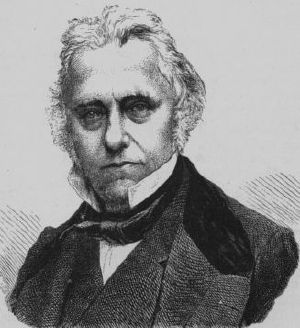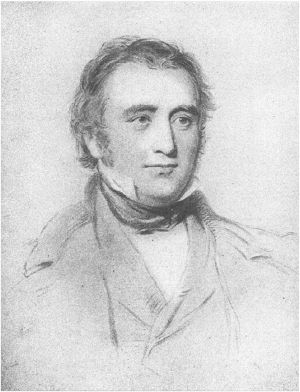Thomas Babington Macaulay
Thomas Babington Macaulay, 1st Baron Macaulay, PC (October 25 1800 – December 28 1859) was a nineteenth-century]] English poet, historian and Whig politician. He wrote extensively as an essayist and reviewer, and on British history. His 1835 Minute on Education in India, where he was a senior Civil Servant, had a lasting impact on colonial attitudes, encouraging a sense of cultural superiority that had not characterized earlier generations of colonial officials. His minute resulted in the policy of only funding education in English following a European curriculum. Oddly, a direct line can be drawn between this and Indian independence, since it was members of the Indian English-speaking educated elite that led the self-rule struggle, inspired by the values of freedom and fair-play they had encountered in English literature. Macauley has intended his English educated elite to be loyal to Britain; instead, appalled at British hypocrisy, they rebelled against their imperial masters demanding self-determination and freedom. Yet the assumptions of racial and cultural superiority that Macauley articulated dominated British policy not only in India but almost everywhere throughout their empire for another hundred years after his death, informing the view that it was Britain's moral responsibility to supervise childlike people elsewhere in the world until they matured enough to rule themselves. Even after World War I, this attitude dominated the Paris Peace Conference when huge portions of the globe were entrusted to European powers on the basis that their populations, which were not consulted about their future, were as yet unready to govern themselves.
Life
The son of Zachary Macaulay, a British colonial governor and abolitionist, Macaulay was born in Leicestershire and educated at Trinity College, Cambridge. Macaulay was noted as a child prodigy. As a toddler, gazing out the window from his cot at the chimneys of a local factory, he is reputed to have put the question to his mother: "Does the smoke from those chimneys come from the fires of hell?" Whilst at Cambridge he wrote much poetry and won several prizes. In 1825 he published a prominent essay on Milton in the Edinburgh Review. In 1826 he was called to the bar, but showed more interest in a political than a legal career.
Macaulay as a politician
In 1830 he became a Member of Parliament for the pocket borough of Calne. He made his name with a series of speeches in favor of parliamentary reform, attacking such inequalities as the exclusion of Jews. After the Great Reform Act, which greatly increased the number of people entitled to vote, was passed, he became MP for Leeds.
India
Macaulay was Secretary to the Board of Control from 1832 until 1833. After the passing of the Government of India Act 1833, he was appointed as the first Law Member of the Governor-General's Council. He went to India in 1834. Macaulay believed in European, especially British, superiority over all things Oriental, as may have been "justified" by the circumstances, in the eyes of many contemporary observers. Serving on the Supreme Council of India between 1834 and 1838 Macaulay was instrumental in creating the foundations of bilingual colonial India, by convincing the Governor-General to adopt English as the medium of instruction in higher education, from the sixth year of schooling onwards, rather than Sanskrit or Arabic then used in the institutions supported by the British East India Company. Although he could not read or speak any Asian language, he confidently declared that a "single shelf of good European literature" was worth the entire "native literature of India and Arabia". Nor could he find a scholar of this literature who was prepared to deny this.
Macaulay's criminal law system was enacted immediately in the aftermath of the Indian rebellion of 1857. It was probably the only systematic code of law in the world. It approaches law in a comprehensive manner that needs little change even after nearly two centuries- in spite of the advances in technology, no "new" category of crime has come into existence since Macaulay. It included the three major codes - The Indian Penal Code, 1860, the Criminal Procedure Code, 1872 and the Civil Procedure Code, 1909. The Indian Penal Code was later reproduced in most other British colonies – and to date many of these laws are still in places as far apart as Singapore, Sri Lanka, Nigeria and Zimbabwe.
Attitude of Cultural Superiority
The term Macaulay's Children is used to refer to people born of Indian ancestry who adopt Western culture as a lifestyle, or display attitudes influenced by colonizers. Macaulay’s own aim had been to create a class of people who, English in all but name would prove to be both loyal servants of the colonial regime as well as people who would act as a bridge to the general population, spreading English ideals among them. This became known as the "trickle-down theory" and was widely adopted by Christian missionaries in India. Missionary educators established prestigious schools which, attracting members of the Indian upper and middle classes were meant to adopt the Christian religion and aid the task of Christianizing the non-elite. Alexander Duff (1806-1878), the first Church of Scotland missionary in India, championed this approach.
The term "Macaulay’s children" is usually used in a derogatory fashion and the connotation is one of disloyalty to one's country and one's heritage.
The passage to which the term refers is from his Minute on Indian Education, delivered in 1835. It reads,
| “ | Insert the text of the quote here, without quotation marks. | ” |
- ↑ Macauley, Thomas Babington "Minute by the Hon'ble T. B. Macaulay, dated the 2nd February 1835", Columbia University,Macaulay's "minute on education" retrieved 18 May 2007
- ↑ cited by Shourie, Arun Missionaries in India: Continuities, Changes, Dilemmas, New Delhi: ASA Publications, 1994 ISBN 9788190019941 page 64
- ↑ ibid
- ↑ MPs were unpaid at this time, since governance was regarded as a public duty performed by the privileged
- ↑ Flint, Eric "Macauley on Copyright Law, Prime Palaver No. 4 September 1, 2001[ http://www.baen.com/library/palaver4.htm Macaulay's speeches on copyright law] retrieved 18 May 2007
- ↑ Goha, Ramachandra "Macaulay’s Minute Revisited", http://www.hindu.com/mag/2007/02/04/stories/2007020400030300.htm, Feb 14 2007 Macaulay's Minute Revisited] retrieved 18 May 2007.
- ↑ from "We must look forward to a time when Indians will hold high offices, Columbia University We must look forward to a time when Indians will hold high offices retrieved 18 May 2007
- ↑ ibid

